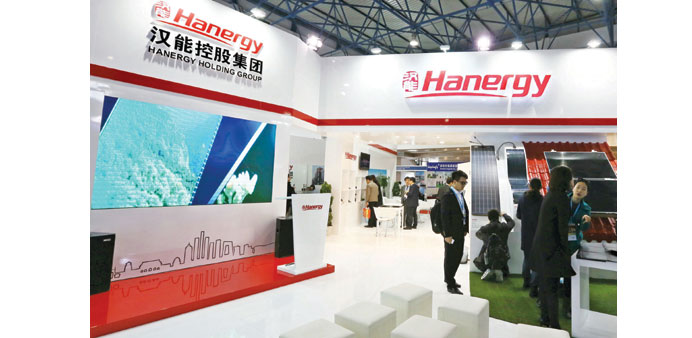A Hanergy exhibition stand is seen at a Clean Energy Expo in Beijing. The Chinese firm is under investigation for several weeks by Hong Kong’s Securities and Futures Commission for alleged market manipulation.
Reuters
Hong Kong
Not long after Hanergy Thin Film Power Group began its annual shareholder meeting at a plush Hong Kong hotel this week, the Chinese solar company’s shares went into free fall.
After opening down 0.3% at 9.30 am on Wednesday, shares in the manufacturer of solar panel-making equipment fell about 5% in the first 15 minutes of trade, before hovering around that level for a little while.
Once the meeting was under way, several massive sell orders involving millions of shares overwhelmed the market, according to an analysis of Thomson Reuters trade log data.
Such was the intensity of the selling pressure that a few trades went through at HK$4.50 per share at 10.17 am, a 36% discount to the HK$7price quoted less than one minute earlier, the data showed.
In all, Hanergy sank 47% in 24 minutes before it was suspended, losing nearly half its market value of about $40bn. Some 170mn shares changed hands, far more than Hanergy’s daily average trading volume for the last month. The trading pattern had many unusual aspects, according to one hedge fund trader.
From the very first milliseconds of the trading session, there were huge sell orders, as seen by the number of shares on the ask side of the trades, he said.
As the price tumbled, the difference between what buyers were willing to pay and what sellers were asking, known as the spread, widened. The large spread indicated the sudden lack of liquidity and the risk of holding the stock.
“Someone was desperate to get out,” said the hedge fund trader, who was not authorised to speak publicly on the matter.
With the stock sinking, Hanergy requested a trading halt “pending release of an announcement containing inside information”.
Hanergy has not responded to several Reuters requests for further comment, although its parent company has said Hanergy’s financials were sound and that it had not sold any of the 30.6bn shares it holds in the unit.
After the stock price plunge on Wednesday, a person familiar with the situation told Reuters that Hanergy had been under investigation for several weeks by Hong Kong’s Securities and Futures Commission (SFC) for alleged market manipulation. The SFC has declined to comment.
The Hong Kong Stock Exchange has declined to comment on the stock’s suspension.
Before the stock price plunge, Hanergy’s value had climbed five-fold since September, helped by investment inflows from mainland China to Hong Kong via a landmark link-up with the Shanghai stock exchange.
At its price peak in March it was worth $48bn, more than its nearest two dozen rivals combined and making founder and chairman Li Hejun one of China’s richest men, even as analysts and market watchers questioned the validity of some of Hanergy’s bullish proclamations.
Hanergy’s sudden stock dive baffled traders and analysts, although Li’s absence from the shareholder meeting raised eyebrows and might have contributed to the plunge, traders said. It later emerged Li was inaugurating a research centre in Beijing.
One experienced equities trader said tick data suggested “very strange” trading behaviour that was unlikely to be a fat-finger error, or the input of wrong information.
Adding to the mystery around Hanergy, Li sold some shares before the price collapse, Hong Kong stock exchange filings show.
Li had increased his short positions to 7.71% of the total issued share capital from 5.81% previously by selling 795mn shares, according to stock exchange filings dated May 18.
At the same time, he bought 26.4mn shares, leaving his net ownership of Hanergy at just above 73% of the company, according to the filings.
No explanation was given for the transactions in the filings. Calls to the company’s Hong Kong offices outside regular business hours went unanswered yesterday.
Short and long positions listed by the Hong Kong stock exchange do not necessarily mean a sale or purchase of a stock, but might be used to indicate the owner has pledged the shares as collateral for a loan, for example.

